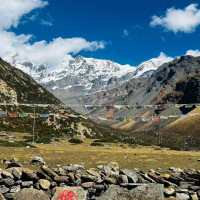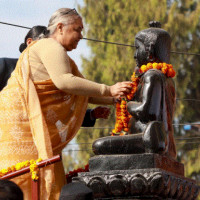- Wednesday, 22 October 2025
Yam Bahadur feeding vultures for 19 years
By Bomlal Giri,Nawalpur, Dec. 24: There was a time when touching a vulture was considered a sin and crossing paths by one was deemed a bad omen. Amid such outdated beliefs, Yam Bahadur Nepali not only worked for vulture conservation but also dedicated himself to feeding them. Initially, he faced negative opinions from society, but gradually, people’s views changed. Today, he is widely respected.
Yam Bahadur Nepali, 41, from Kawasoti-7, begins his day like any other person by heading to work. But his workplace is unique, the Jatayu Restaurant, which is located a short distance from his home. Riding his motorcycle, he reaches the restaurant early every morning to start his daily routine.
Yam Bahadur has been working at the Jatayu Restaurant since its establishment 19 years ago. The restaurant was set up as a vulture conservation centre, but in its early days, finding personnel to care for and feed vultures was challenging due to societal stigma.
However, Yam Bahadur readily accepted the role and became an integral part of the initiative. Today, he is affectionately known among conservationists as the ‘Chef for Vultures.’
Expressing his commitment to vulture conservation, Yam Bahadur shared, “I plan to dedicate the rest of my life to caring for vultures.”
Jatayu Restaurant Chairman DB Chaudhary said, "During the early days, society was unaware of the importance of vultures. Yam Bahadur’s willingness to take on this work inspired others in the community.”
Yam Bahadur begins his day at the restaurant by checking if any vultures are unwell and ensuring their food is ready. He also takes care of the cattle kept at the restaurant’s cowshed, releasing them for grazing.
He travels across the district, responding to information about cattle that have died naturally or are near death. After consulting technicians to ensure the carcasses are safe for vultures to consume, he transports them to the restaurant. Over the years, Yam Bahadur has gained expertise in identifying medications or treatments that might harm vultures.
In addition to feeding vultures, Yam Bahadur assists with their treatment. Whenever a vulture is reported sick, he accompanies technicians to the site, helps transport the bird to Jatayu Restaurant and supports its care and recovery.
His dedication has earned him recognition not only from humans but also from the local vultures, who can identify him from afar. “At first, I was unsure how to do this work. Over time, I became friends with the vultures. Even the cattle recognise me now, they know when I arrive or leave,” he said with pride. “When I ride my motorcycle to the feeding centre, the vultures follow me.” Being called the 'Chef for Vultures' by so many gives me a sense of pride,” he added.
“When I enter the restaurant’s gate, the vultures fly to greet me. Even the cattle at the cowshed follow me around,” he said.
While many of his peers pursued foreign employment or other professions, Yam Bahadur found happiness in caring for vultures. Initially, society’s attitude toward him was negative, but over time, people’s perceptions shifted. “Those who once saw vultures as untouchable now see their value. This change in mindset might be why their numbers have increased,” he shared.
Yam Bahadur has one particular request -- a vehicle to transport food for the vultures. “It is challenging to collect food from various locations without a vehicle. With donor support, we could bring cattle from places like Daunne or Gaindakot,” he said.
Over two decades, Yam Bahadur has also become an advocate for vulture conservation, educating visitors at the restaurant about their feeding habits and behaviours. Initially paid by Jatayu Restaurant, he is now an employee of the Bird Conservation Nepal (BCN), which provides him with a salary.
Globally, 23 species of vultures exist, nine of which are found in South Asia -- all present in Nepal.
Among these, species like the White-rumped Vulture, Slender-billed Vulture, Red-headed Vulture and Indian Vulture are critically endangered, while others are near-threatened.
According to DB Chaudhary, a conservationist, Nepal is home to an estimated 20,000 vultures across all species. When the Jatayu Restaurant began in 2005, there were only 72 vultures of seven species. By 2023, the number had risen to 517 vultures of eight species.
Three migratory species--
Slender-billed Vultures, Red-headed Vultures and Eurasian Griffons--arrive in Nepal during winter to breed. The remaining six species are resident in the area.
In the 1990s, Nepal’s vulture population, once numbering in the millions, faced a sharp decline, alarming conservationists. This led to the establishment of Jatayu Restaurant in 2006 as the first community-level vulture conservation centre.
The success of this model has inspired the creation of similar centres across Nepal, turning Nawalpur into a hub for vulture tourism.
















